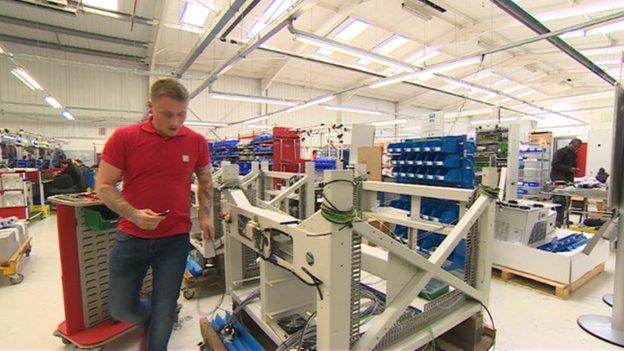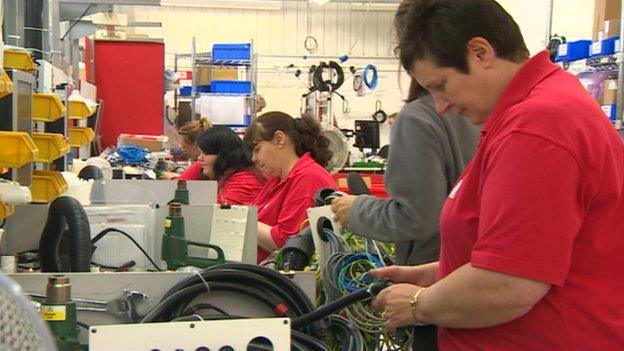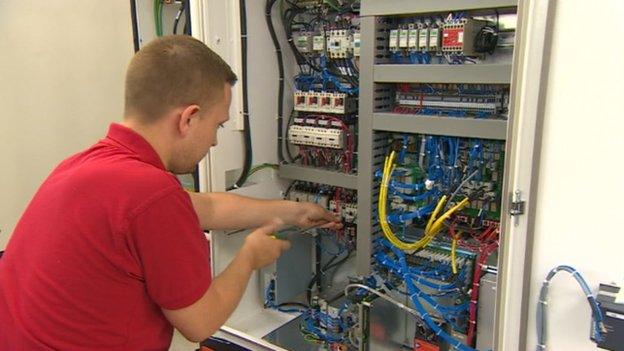The productivity problem that has economists baffled
- Published
- comments

Workers at PP Electrical Systems have boosted their productivity by 16%.
So I may be science correspondent these days but I was a real research scientist once, and like many of my colleagues in the lab we always took a bit of a dim view of economics.
Not for nothing is it called the dismal science.
The physicist in me finds the sight of economists wrestling with the "productivity puzzle" a little bit amusing.
Because it's not like they can drop the British workforce into an experiment and see what makes them tick. It's all theory.
But it is an important problem and we need to understand it.
The productivity puzzle
So what is the "productivity puzzle"?
Basically it is a gap. As a healthy economy our productivity is usually on a nice upward path.
Companies are always getting better at making things or better at providing services. The upward path can stall during a recession but then it gets right back on track once the worst is over.

Workers are encouraged to find 6% productivity savings wherever they can.
Except after the last recession that didn't happen. Productivity has more or less flat-lined. The gap between where we should be and where we are is now around 16% and there's no sign of the gap closing. And this seems to be a particularly British problem right across our entire economy.
So what's happened? Search me! And indeed search a passing economist. But everyone has a theory, from the Bank of England, external to journalists. Here are some favourites;
Companies went into survival mode during the recession and haven't really come out of it yet.
We just aren't very good at measuring British productivity
We're just not innovating as much as we used to.
I visited PP Electrical Systems in Walsall to try and learn more about all this. From the moment you walk through the door there's a real buzz about the place. While UK productivity has stagnated, here it is up around 18%.
Staff I talked to from the factory floor to the MD were enthusiastic and genuinely inspiring to be around. It's taken a decade to create this company wide culture that clearly has had impressive results. How to replicate it elsewhere? Well the simple answer is English people need to be encouraged to "get their fingers out" according to the boss. Show better intent when it comes to the workplace.

PP Electrical Systems make electrical control systems in their Walsall factory.
Staff are encouraged to find 6% savings anywhere they can, for which they get a reward in the form of a small badge. But bosses here think this incremental improvement isn't enough on its own. They're always looking for a big new innovation where they can tear everything up and make a massive improvement.
Bigger problems
And that's a clue to the bigger worries about our productivity. A lack of big innovation. Not just on the factory floor but in general. Where are the British Googles, Microsofts and Apples?
Politicians are particularly fond of reminding us that if we were as productive as the Americans then our GDP would rise by 31% which is equivalent to £21,000 per household per year.
Now it might be this apparent gap is actually a glitch in the way we measure things, if might be a result of British capitalism being a different "flavour" to that in the US.
Or it could be the productivity puzzle is finally showing us there is a real, fundamental problem with how we do business. Think about your job. Could you find a 6% improvement in how you work? Would you want to suggest one to your boss if you could? And how on earth can the government go about improving things?
Find out on The Sunday Politics (Midlands) at 11am on BBC One.